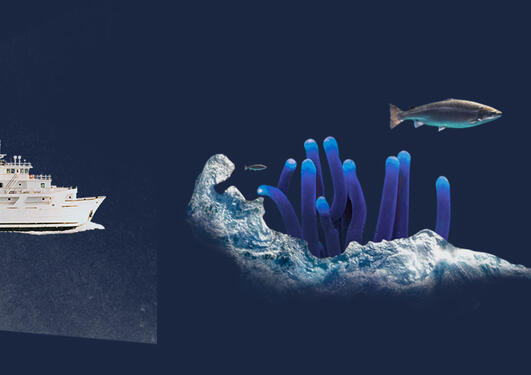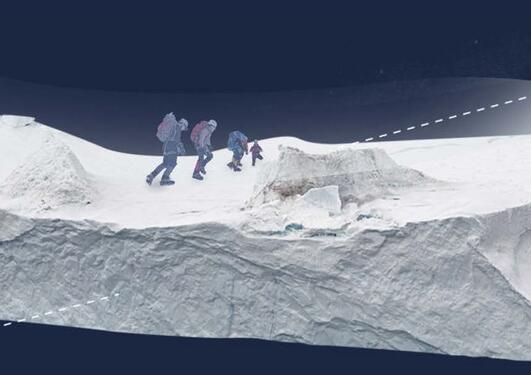Research possibilities for the SEAS postdoctoral research fellow in mathematical and statistical methods for marine sustainability
The information on this page is a supplement to the complete advertisement of the position in the recruitment-portal Jobbnorge. The full advertisement of this position in Jobbnorge will be available after august 1, and linked from this webpage. Call deadline is October 31, 2021.
Main content
Position | SEAS postdoctoral research fellow at Department of mathematics |
Research area | Mathematical and statistical methods for marine sustainability (4 thematic areas) |
Available supervisors | 1) Guttorm Alendal, 2) Iain G. Johnston, 3) Hans J. Skaug and 4) Henrik Kalisch & Magnus Svärd. |
Mobility | For an incoming or outgoing candidate |
Unit of employment | Department of mathematics at University of Bergen |
Group affiliation(s) | Depending on project |
Thematic areas and supervisors
This position is within the area of mathematical and statistical methods for Marine Sustainability. The position is open to either an incoming or an outgoing candidate, see mobility rules. The successful candidate will be employed at the Department of Mathematics and, depending on project, be included in the Statistics or the Fluid Mechanics research group. Available thematic areas and supervisors:
- Marine environmental modelling and monitoring
Supervisor: Professor Guttorm Alendal - Predicting robustness of marine organisms to environmental change using data and simulation
Supervisor: Associate Professor Iain G. Johnston - Estimation of spatio-temporal variation in marine species distribution - Spatially clustered point processes for marine ecology
Supervisor: Professor Hans J. Skaug - Ocean sustainability: Numerical simulation of wave-by-wave processes in the nearshore zone
Supervisors: Professor Henrik Kalisch and Magnus Svärd
Information about the possible project themes, supervisors, research group and research possibilities for the fellow is available below. For further details about the research possibilities please contact the relevant supervisor(s).
Research possibilities and resources: Marine environmental modelling and monitoring (Guttorm Alendal)
We are open for project ideas within the broad topic of marine process modelling and environmental monitoring.
For several years, the Fluid Mechanics group has been involved in national and international projects related to marine process modelling, focusing on monitoring the marine environment. Through our involvement in dCod 1.0,[1] using the Atlantic Cod as a canary bird for the marine environment, we have built up expertise in biological modelling, data analysis of omics data, and work in cross-professional projects.
The Institute is partner in two newly established Centers for Research Based Innovations, CRIMAC [2]and Smart Ocean[3]. In the former, machine learning techniques will be used to classify fish stocks from broadband acoustics using machine learning techniques. This work will be done in close collaboration with the Institute of Marine Research. In Smart Ocean we work with uncertainty quantification and design of marine monitoring programs.
For many years, the institute has been an international player in research on marine monitoring related to underground storage of CO2 offshore. Among others, through two EU projects, ECO2[4] and STEMM-CCS[5], and the ongoing ACTOM[6] project. ACTOM, which we also coordinate, is a very interdisciplinary project, with expertise in law, marine chemistry, modelling of flow in porous media, marine monitoring and instrumentation, RRI and not least ocean modelling.
An extensive national and international scientific network is available, locally (e.g., Institute of Marine Research, Nansen Environmental and Remote Sensing Centre and NORCE) and internationally (e.g., Plymouth Marine Laboratory, National Oceanography Centre in Southampton and GEOMAR in Germany). Other sectors include industry contacts (e.g., OCTIO, Equinor) and governmental agencies (e.g., the Norwegian Environment Agency, the Norwegian Petroleum Directorate).
- Contact: Guttorm Alendal, guttorm.alendal@uib.no
- Research group: Fluid dynamics
- Co-supervisors can come from Geophysical Institute, Department of Biological Sciences or Department of Physics and Technology, or from Faculty of Law, Faculty of Medicine, or from Western Norway University of Applied Sciences, NORCE or any of the local institutes.
[1] https://www.uib.no/en/dcod
[2] https://www.hi.no/en/hi/forskning/projects/crimac
[3] https://www.uib.no/en/smartocean
[4] https://www.eco2-project.eu/
[5] https://www.stemm-ccs.eu/
[6] https://actom.w.uib.no/
Research possibilities and resources: Predicting robustness of marine organisms to environmental change using data and simulation (Iain G. Johnston)
This interdisciplinary project will combine approaches from mathematical modelling, bioinformatics, and statistics to develop new ways of predicting how marine organisms will respond to environmental changes.
The researcher will join a dynamic ecosystem including collaborations with biomathematicians, toxicologists, computational biologists, and more. Human activities are changing ocean physics, chemistry, and biology. Information on how marine organisms respond to these changes is vital to understand the consequences of human actions, and to inform policy that may mitigate these perturbations. However, experimental approaches characterizing the wide range of effects that combinations of factors may have on different organisms are challenging.
This project will complement ongoing experimental work with theoretical study, informed by bioinformatic data, of how marine organisms will respond to these physical and biological changes. It is anticipated that the approaches taken will include population genetics and modelling (to study how a “reservoir” of genetic diversity can allow adaptability in marine species), metabolic modelling (to study the within-organism implications of different temperatures and chemical stimuli), and stochastic modelling (to account for the necessarily noisy nature of these complex biological systems). We will also employ tools from statistical inference and model selection to select, parameterize, and validate these models with diverse existing data, and with emerging data from our collaborations with experimental biologists.
- Contact: Iain G. Johnston, email: iain.johnston@uib.no
- Research group: Stochastic Biology Group (group website https://org.uib.no/stochasticbiology/)
- Scientific collaborations with Emory University, USA (Matthew Gribble) and within UiB (Anders Goksøyr, Andreas Hejnol).
Translational collaborations within UiB on Responsible Research and Innovation and policy connections for marine management (Dorothy Dankel, Mimi Lam)
Co-supervisor at Department of Biology, UiB and/or Computational Biology Unit, UiB.
Research possibilities and resources: Estimation of spatio-temporal variation in marine species distribution - Spatially clustered point processes for marine ecology (Hans J. Skaug)
The goal of this interdisciplinary project will be to adapt and develop state-of-the-art spatio-temporal statistical methods for fisheries and marine mammal line transect data. Statistical tools will include Gaussian Markov random fields (GMRFs), to account for spatial correlation, and the software package TMB (Template Model Builder) for fitting models to data. A possible topic is also Markov Modulated Point Processes (MMPPs) for clustered line transect data. The candidate will receive supervision from an experienced mentor in statistical ecology and statistical computation, and have access to unique datasets on fish stocks and marine mammal populations.
- Contact: Hans J. Skaug, email: Hans.Skaug@uib.no
- Research group: Statistical Ecology.
- Collaboration with Institute of Marine Research in Tromsø (mentor: Martin Biuw)
Co-supervisor at Department of Biology, UiB.
Research possibilities and resources: Ocean sustainability - Numerical simulation of wave-by-wave processes in the nearshore zone (Henrik Kalisch & Magnus Svärd)
Modern coastal zone management is heavily focusing on the maintenance of beaches for both the protection from wave and storm surge driven flooding events as well as for touristic purposes. Shoreline retreat as well as beach and dune erosion are common problems worldwide and often associated with an increase in flood risks.
Multiple studies have addressed the calculation of wave-driven changes in the sand budget along various coastlines worldwide. However, the long-term evolution of shoreline morphology is depending on multiple factors, of which most are challenging quantify accurately. Consequently, reliable computations of beach evolution have only been accomplished with deterministic models for short periods of time.
Recent efforts in the development of phase-resolving numerical models have led to a better quantification of local wave processes at high resolution. Furthermore, features such as formulations for sediment transport have been built in and successfully applied to the determination of local shoreline changes during energetic events over short periods of time. This allows for better assessment of short-term changes in the local beach morphology and helps to address efforts related to mitigating flood risks.
One of the advantages of phase-resolving nearshore wave models in contrast to phase-averaged models is the ability to compute phase-coherent wave amplifications, which can be locally of importance for wave run-up and currents. The implementation of these phase-resolving models on a graphics cards (GPUs) allows for extremely fast computations in real time over local stretches of coastlines. This helps to quickly assess a full range of wave and wave-driven current scenarios for a beach and to populate databases for further statistical analyses.
The goal of this project is to develop mathematical models, numerical tools, and high-performance implementations, that address these problems. The candidate will join the fluid dynamics group at UiB and receive additional supervision from the University of Roma Tre as well as the University of Pau.
- Contact: Henrik Kalisch, email: Henrik.Kalisch@uib.no, Magnus Svärd, email: Magnus.Svard@uib.no
- Research group: Fluid mechanics
Co-supervisors: Francesco Lagona (UiB, statistics, University Roma Tre, Italy), Volker Roeber, (UiB, fluid mechanics, University of Pau, France).
See the full advertisement in Jobbnorge
The full advertisement in Jobbnorge will be available after august 1, 2021. Call deadline is October 31, 2021.

